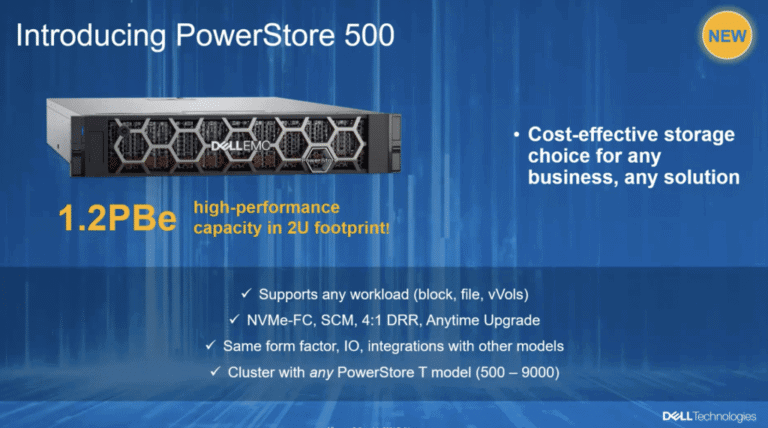Dell Technologies has announced a refresh of its PowerStore storage platform. The second generation of the storage infrastructure platform offers higher speeds and a new lower entry price.
The main improvement in the refreshed platform is an upgrade in the PowerStoreOS operating system that runs on the machines. PowerStoreOS 2.0 is expected to deliver speed improvements of 20 percent in mixed workloads and be 65 percent faster in write-intensive situations. Also added is support for NVMe over Fibre Channel. This is a technique for using fibre connections to enable similar storage performance in external storage arrays as to when the storage is connected directly to the compute system. It remains possible to run both Fibre Channel and SCSI protocols over the same cables.
Enhancements to AppsON
Enhancements have also been made to AppsON, the built-in VMware ESXi Hypervisor. It is now possible to freely move VMs and applications within clustered applications. According to Jon Siegal, marketing vice president at Dell EMC, this is particularly useful in scenarios with edge computing and distributed analytics. “This allows customers to consolidate even more storage-intensive workloads at the edge or even running big-data analytics applications that benefit from running on the array directly”, he says.
Related: Dell EMC PowerStore: new intelligent storage system for all data
4:1 data reduction ratio
Dell has also worked to improve data reduction and recovery from failed disks. By using intelligent deduplication and compression, Dell now guarantees a 4:1 data reduction ratio. In addition, the amount of cache used automatically adjusts based on available storage capacity. The automated management should provide up to 20 percent more IOPS during peak loads.
Easier management than RAID
The Dynamic Resiliency Engine has gained support for single- or dual-parity redundancy to better meet customer requirements for availability and protection against multiple drives failing simultaneously. The software automatically adjusts rebuild rates based on current workloads.
Dell claims this method requires much less management than conventional RAID setups. “It automates all the complex processes associated with drive configuration, as well as redundancy and tiering, for up to 98% less management effort compared with traditional RAID subsystems,” Siegal said. “Everything’s handled by the intelligence software itself, right down to replenishing capacity if a drive fails.”
New entry-level offerings
Finally, Dell has added a number of new hardware options to the PowerStore line-up. The PowerStore 500 is the new entry-level model, with a 1.2PB capacity in a 2u format. It supports all features in PowerStoreOS 2.0 and can handle up to 1,500 VMs or 2.4 million SQL transactions per minute. In the US, the system sells for 28,000 dollars. This is equivalent to about 23,000 euros, although local prices may vary.
The PowerStore 500 can be clustered in up to four units for a storage capacity of 4.8PB. When clustered with other models in the PowerStore line, even a maximum capacity of 9.8PB can be achieved. The system will be available starting June 10, coinciding with the release of PowerStoreOS 2.0.
